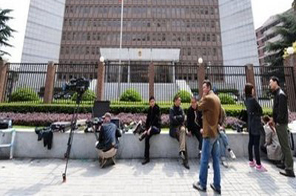Rio trial raises concerns for foreign firms: Australia
SYDNEY: Australia warned on Tuesday that China's handling of a corruption trial for four Rio Tinto workers had raised serious questions for foreign firms doing business with the emerging power.
A Shanghai court Monday sentenced Australian executive Stern Hu to 10 years in jail after convicting him, along with three Chinese colleagues, of industrial spying and pocketing substantial bribes.
Australia's Prime Minister Kevin Rudd condemned bribery but voiced reservations about the commercial espionage conviction, which was dealt with behind closed doors.
"The trial on the second charge was held in secret with no media and no Australian officials present for it. This has left therefore serious unanswered questions about this conviction," Rudd told reporters.
"In holding this part of the trial in secret, China I believe has missed an opportunity to demonstrate to the world at large transparency that would be consistent with its emerging global role."
Anglo-Australian Rio, one of the world's biggest mining companies, moved quickly to sack the four for their "deplorable" behaviour and said it hoped the case would not affect ties with China, its biggest customer.
But Foreign Minister Stephen Smith said the case could raise concerns for foreign companies doing business in China, particularly regarding its definition of commercial secrets.
"There is no clarity from China here as to whether we are dealing with what the international business community... would simply regard as the normal ebb and flow of commercial discussions or commercial information," he said.
"It was, in our view, a lost opportunity and that's obviously had repercussions for Stern Hu and the other three employees but it may well have repercussions in terms of the international community's dealing with China."
Smith told Sky News that the foreign companies were unlikely to cut off relations with China, where rapid growth is seen as the engine for a global economic recovery, based on the case.
But he said: "We want China to emerge not just economically but as a responsible international citizen."
Australian business backed the government's call for greater clarity, with the Australian Chamber of Commerce and Industry describing the fact that consular officials were excluded from part of the trial as worrying.
"Australian business executives doing business in China need to recognise different political and legal contexts and put in place management infrastructure to deal with these issues," said the chamber's Nathan Backhouse. Australian National University academic Ann Kent said the stiff sentences handed to Hu and his colleagues, who face between seven and 14 years behind bars, would serve to remind foreign firms "to be very careful" in China.
"It sends a message to them that they also need to avoid appointing to executive positions in China people who are former Chinese nationals and are therefore very vulnerable to this kind of treatment," she said.
Rudd added that Australia's relations with its top trading partner would not be affected by the case, which caused a temporary chilling of ties last year.
"I believe the bilateral relationship will sustain these sorts of pressures," Rudd said. "We've had disagreements with our friends in Beijing before, I'm sure we'll have disagreements again."
Analysts say Rudd, a Mandarin speaker, faces a delicate balancing act in preserving the vital relationship while not looking too soft on China.






